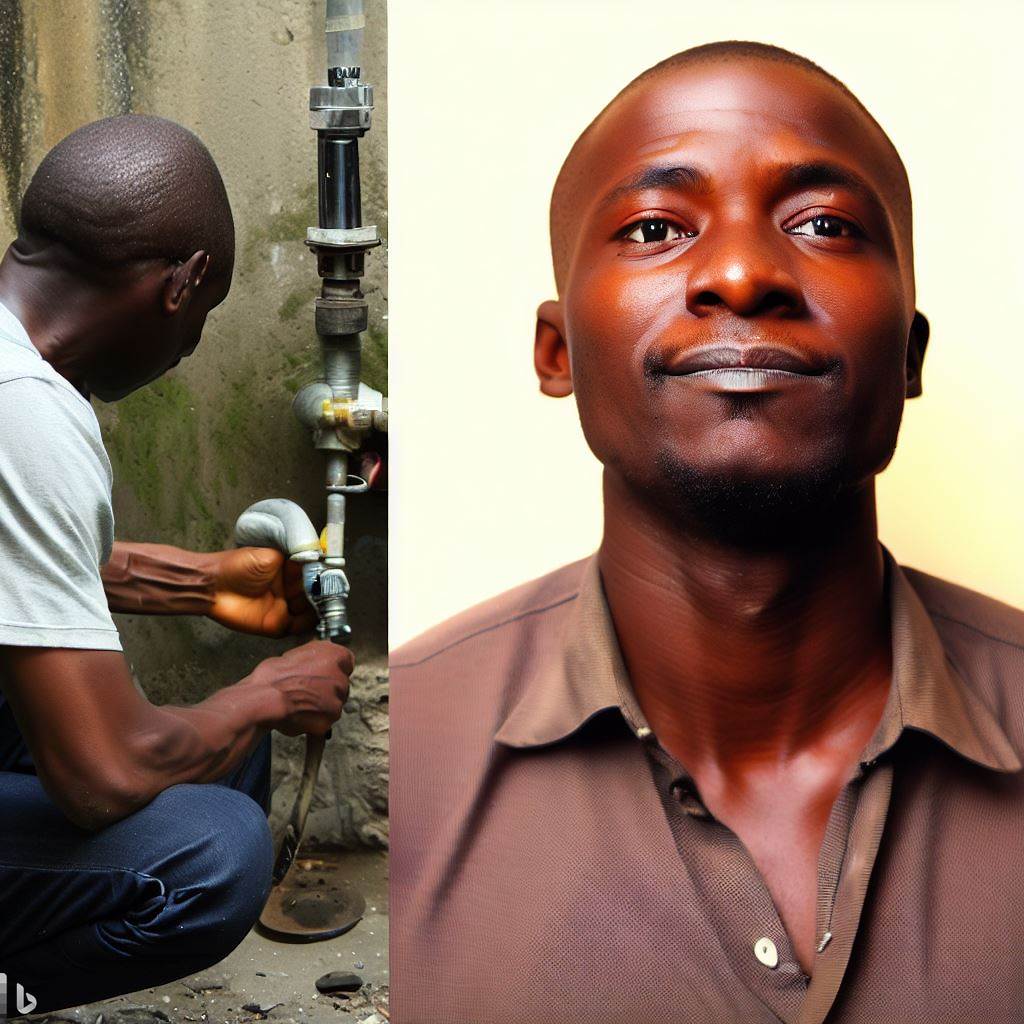Introduction
Let’s talk about Eco friendly plumbing practices in Nigeria.
Eco-friendly plumbing practices involve environmentally conscious methods of water conservation and waste management.
Nigeria is witnessing a growing trend towards eco-friendly plumbing practices.
The purpose of this blog post is to explore the benefits and importance of eco-friendly plumbing practices in Nigeria.
Introduction to Eco-Friendly Plumbing Practices:
Eco-friendly plumbing involves using sustainable techniques and materials to conserve water, reduce energy consumption, and minimize environmental impact.
The Growing Trend in Nigeria:
- Water Scarcity: Nigeria faces water scarcity issues, making eco-friendly plumbing increasingly crucial.
- Environmental Awareness: Nigerians are becoming more environmentally conscious, seeking eco-friendly solutions.
- Government Initiatives: Government regulations encourage eco-friendly plumbing practices, such as rainwater harvesting.
Purpose of the Blog Post
This blog post aims to shed light on the burgeoning trend of eco-friendly plumbing practices in Nigeria. We’ll explore:
- Water-Saving Fixtures: Discussing low-flow faucets, toilets, and showerheads to reduce water wastage.
- Solar Water Heaters: Highlighting the use of solar energy to heat water, conserving electricity.
- Rainwater Harvesting: Exploring methods to collect rainwater for non-potable purposes.
- Greywater Recycling: Detailing the reuse of greywater from sinks and showers for irrigation.
By the end of this post, you’ll understand the importance of eco-friendly plumbing practices in Nigeria, not only for conserving resources but also for contributing to a healthier planet.
Join the movement toward sustainable plumbing solutions for a greener future.
The Importance of Eco-Friendly Plumbing Practices
Conserving Water and Energy
- Conserving water and energy is crucial to minimize environmental impact.
- By implementing eco-friendly plumbing practices, we can reduce water and energy consumption.
- This leads to substantial savings on utility bills for homes and businesses.
- Installing low-flow faucets, showerheads, and toilets can significantly reduce water usage.
- Energy-efficient appliances such as water heaters and pumps help conserve energy.
Impact of Inefficient Plumbing Practices on the Environment
- Inefficient plumbing practices contribute to water scarcity and pollution.
- Undetected leakages can waste thousands of liters of water, putting a strain on resources.
- Wastewater containing harmful chemicals can contaminate natural water sources and ecosystems.
- Energy wastage from inefficient systems increases carbon emissions, contributing to climate change.
- Unsafe disposal of sewage leads to waterborne diseases, threatening public health.
The Need for Sustainable Solutions in Nigeria
- Nigeria faces significant challenges related to water scarcity and energy deficiency.
- Eco-friendly plumbing practices offer sustainable solutions to address these issues.
- Implementing rainwater harvesting systems can help alleviate water scarcity problems.
- Using solar-powered water heaters reduces dependency on traditional energy sources.
- Water recycling systems can minimize water usage and ensure its availability for future generations.
- Green building practices, including eco-friendly plumbing, promote overall sustainability.
- Adopting these practices can enhance Nigeria’s efforts to achieve the Sustainable Development Goals.
Essentially, eco-friendly plumbing practices play a vital role in conserving water, energy, and preserving the environment.
By implementing these practices in Nigeria, we can address water scarcity, reduce pollution, and contribute to sustainable development.
The significance of conserving water and energy cannot be overstated, as it leads to cost savings, minimizes resource strain, and protects public health.
Sustainable solutions, such as rainwater harvesting and solar-powered systems, offer feasible alternatives for water and energy management.
It is imperative for individuals, businesses, and policymakers in Nigeria to embrace eco-friendly plumbing practices and work towards a greener future.
Read: Job Opportunities for Chefs in Nigeria: A Review
Common Eco-Friendly Plumbing Practices in Nigeria
Using low-flow fixtures and toilets
- Low-flow fixtures conserve water and reduce water bills for households and businesses.
- In Nigeria, low-flow options are becoming more readily available and affordable in the market.
Harvesting rainwater
- Rainwater harvesting involves collecting and storing rainwater for various non-potable uses.
- Local initiatives in Nigeria promote rainwater harvesting as a sustainable water management solution.
Installing water-efficient appliances
- Water-efficient appliances play a crucial role in minimizing water wastage and conserving resources.
- In the Nigerian market, there are several water-efficient appliances to choose from, such as efficient washing machines and dishwashers.
Plumbing practices have evolved over the years to prioritize environmental sustainability and conservation.
Nigeria, as a developing country, is witnessing a growing trend towards eco-friendly plumbing practices.
These practices not only help in reducing water consumption but also contribute to cost savings and a healthier environment.
Using low-flow fixtures and toilets
Low-flow fixtures, such as faucets, showerheads, and toilets, are designed to limit water flow without compromising functionality.
They significantly reduce water usage compared to traditional fixtures. The benefits of using low-flow fixtures are twofold. In fact, they help conserve water by minimizing unnecessary wastage.
Basically, they contribute to reduced water bills for households and businesses, promoting better financial management.
While low-flow fixtures were once considered expensive and inaccessible in Nigeria, the scenario has changed in recent years. Local manufacturers and distributors now offer a wide range of affordable low-flow options.
This increased availability makes it easier for individuals and organizations to adopt eco-friendly plumbing practices without a hefty upfront investment.
Harvesting rainwater
Rainwater harvesting is a technique that involves collecting and storing rainwater for various non-potable uses.
It provides an alternative water source for activities like irrigation, toilet flushing, and laundry. In Nigeria, where water scarcity is a pressing issue, rainwater harvesting plays a vital role in augmenting water supply.
Local initiatives in Nigeria are actively promoting rainwater harvesting practices.
These initiatives educate individuals and communities about the benefits of rainwater harvesting and provide training on proper harvesting techniques.
By raising awareness and facilitating implementation, these initiatives contribute to water conservation efforts on a larger scale.
Installing water-efficient appliances
Water-efficient appliances, such as washing machines, dishwashers, and water heaters, utilize advanced technologies to reduce water consumption.
They optimize water usage without compromising performance, resulting in substantial water savings. Installing water-efficient appliances not only benefits the environment but also leads to cost savings through reduced water bills.
In Nigeria, the market for water-efficient appliances is expanding. Both international and local manufacturers offer a variety of efficient appliances tailored to the Nigerian market.
For example, energy-efficient washing machines with adjustable water levels and water-saving dishwashers help households minimize water usage while maintaining cleanliness.
The availability of such appliances encourages individuals and businesses to make sustainable choices for their plumbing needs.
Overall, eco-friendly plumbing practices are gaining momentum in Nigeria, driven by the need for water conservation and environmental sustainability.
By utilizing low-flow fixtures, harvesting rainwater, and installing water-efficient appliances, individuals and organizations can significantly contribute to reducing water usage and promoting a greener future.
The affordability and accessibility of these practices and technologies in the Nigerian market further facilitate their adoption and widespread implementation.
Embracing eco-friendly plumbing practices is not only a responsible choice but also a step towards building a more sustainable and water-secure future for Nigeria.
Read: Culinary Events in Nigeria: A Chef’s Participation

The Role of Plumbing Professionals in Promoting Eco-Friendly Practices
Discuss the importance of involving plumbing professionals
- Plumbing professionals play a crucial role in promoting eco-friendly plumbing practices.
- They have the knowledge and skills to recommend and implement sustainable solutions.
- Their expertise ensures that eco-friendly practices are properly integrated into plumbing systems.
- By involving professionals, the effectiveness and reliability of eco-friendly plumbing solutions are guaranteed.
- They have the experience to identify potential issues and address them proactively.
- Plumbers can assess the plumbing needs of a building and suggest the most suitable eco-friendly options.
Highlight the knowledge and expertise needed to implement eco-friendly solutions
- Plumbing professionals need to be knowledgeable about eco-friendly materials and technologies.
- They must understand the principles of water conservation and energy efficiency.
- Knowledge about sustainable plumbing products, such as low-flow fixtures, is crucial.
- Understanding the proper installation and maintenance of eco-friendly systems is essential.
- Professionals should stay updated on the latest advancements in green plumbing technologies.
- They need expertise in designing and implementing systems that minimize environmental impact.
Provide tips for finding qualified and eco-conscious plumbers in Nigeria
- Look for plumbers who are certified by recognized plumbing associations or organizations.
- Ask for references from previous eco-friendly plumbing projects they have worked on.
- Check if the plumber has experience in implementing sustainable plumbing solutions.
- Consider hiring professionals who are knowledgeable about local regulations and codes.
- Read online reviews and customer testimonials to assess their reputation and reliability.
- Engage in conversations with potential plumbers to gauge their eco-consciousness and commitment.
Plumbing professionals play a vital role in promoting eco-friendly plumbing practices in Nigeria. Their involvement ensures the proper implementation of sustainable solutions, leading to water conservation and energy efficiency.
The knowledge and expertise of plumbers are essential in integrating eco-friendly practices into plumbing systems, minimizing environmental impact.
To find qualified and eco-conscious plumbers, it is important to consider their certifications, experience, reputation, and commitment to sustainable plumbing.
By working with skilled professionals, Nigeria can continue to grow its trend of eco-friendly plumbing practices and contribute to a greener future.
Read: Health and Safety for Chefs in Nigeria: A Must-Know
Government Regulations and Incentives for Eco-Friendly Plumbing
Existing Government Regulations
- The Nigerian government has implemented regulations to promote eco-friendly plumbing practices.
- These regulations aim to reduce water waste, minimize pollution, and protect the environment.
- Requirements for water-efficient fixtures and appliances are enforced in new construction and renovations.
- Plumbing installations must comply with specific standards and guidelines to ensure sustainability.
- Rules are in place to prevent the use of lead-based materials in plumbing systems, safeguarding public health.
Government Incentives
- The government offers various incentives to encourage eco-friendly plumbing initiatives in Nigeria.
- Tax breaks and deductions are provided to individuals and businesses using sustainable plumbing techniques.
- Grants and subsidies are available to support the adoption of eco-friendly technologies and practices.
- Financial incentives are given to builders and plumbing contractors who prioritize green plumbing in their projects.
- The government collaborates with financial institutions to offer low-interest loans for eco-friendly plumbing installations.
Importance of Awareness and Advocacy
- Creating awareness about eco-friendly plumbing practices is crucial for their widespread adoption.
- Advocacy efforts play a significant role in pushing for stronger government policies and regulations.
- By advocating for eco-friendly plumbing, citizens can influence lawmakers and decision-makers to prioritize sustainability.
- Stronger policies can ensure that eco-friendly practices become the norm, benefiting both the environment and society.
- Public support and activism are essential for driving positive change and promoting sustainable plumbing practices.
All in all, the Nigerian government has recognized the importance of eco-friendly plumbing practices and has implemented regulations and incentives to support their adoption.
These measures aim to protect the environment, conserve water, and promote sustainable development.
In general, creating awareness and advocating for stronger policies are crucial for the long-term success of eco-friendly plumbing in Nigeria.
By working together, government, citizens, and plumbing professionals can make a significant impact in building a sustainable future.
Read: Nigeria’s Customer Service Industry: Key Challenges & Solutions
Successful Eco-Friendly Plumbing Projects in Nigeria
Highlight at least three successful case studies of eco-friendly plumbing projects
- Lagos State Water Corporation Solar-Powered Water Pumps: In Lagos, solar-powered water pumps have been implemented to reduce energy consumption and provide reliable water supply to communities.
These pumps harness the sun’s energy, eliminating the need for fossil fuel-powered pumps. - Green Building Initiative in Abuja: The Green Building Initiative in Abuja aims to promote sustainable construction practices, including eco-friendly plumbing systems.
These buildings incorporate rainwater harvesting, greywater recycling, and efficient fixtures to conserve water and reduce environmental impact. - Eco-Toilets in Ogun State Schools: Ogun State government has introduced eco-toilets in schools to tackle sanitation challenges.
These eco-toilets use minimal water or none at all, instead relying on composting technology to convert human waste into organic fertilizer. This innovation reduces water waste and promotes sustainability.
Discuss the challenges faced and lessons learned from these projects
- Funding: One of the main challenges faced by eco-friendly plumbing projects is obtaining sufficient funding.
Lack of financial support hampers the implementation and expansion of these initiatives, limiting their impact. - Technical Expertise: Another challenge is the shortage of professionals with expertise in eco-friendly plumbing practices.
Training programs and capacity-building initiatives should be in place to equip individuals with the necessary skills to undertake such projects effectively. - Awareness and Acceptance: Educating the public and gaining acceptance for eco-friendly plumbing practices have proven challenging.
Many people are not familiar with these sustainable techniques and may resist change. Awareness campaigns and community engagement are crucial to overcome these barriers.
Emphasize the positive impact and potential for further growth in Nigeria
The successful eco-friendly plumbing projects in Nigeria have demonstrated several positive impacts:
- Environmental Conservation: By implementing eco-friendly plumbing practices, water resources are conserved, reducing pressure on rivers and groundwater sources.
This contributes to the preservation of Nigeria’s natural resources and helps mitigate water scarcity issues. - Energy Efficiency: Utilizing solar-powered pumps and other energy-efficient plumbing systems reduces reliance on fossil fuels, decreasing carbon emissions and tackling climate change.
This transition to sustainable energy sources aligns with Nigeria’s commitment to the Paris Agreement. - Health and Sanitation Improvements: Eco-toilets and other water-saving measures in schools and public places improve hygiene and sanitation.
Reduced water usage also minimizes the risk of waterborne diseases, benefiting public health.
The successful implementation of these projects indicates the immense potential for further growth in eco-friendly plumbing practices in Nigeria.
With increased awareness, improved funding, and the availability of technical expertise, more innovative projects can be undertaken across the country.
The integration of eco-friendly plumbing into urban planning and infrastructure development will pave the way for a greener and more sustainable future for Nigeria.
Conclusion
- Eco-friendly plumbing practices in Nigeria are crucial for a sustainable future.
- The growing trend indicates the potential for continuous and sustainable growth.
- Join the movement towards eco-friendly practices and support this positive trend.
Importance of Eco-Friendly Plumbing Practices:
- Eco-friendly plumbing preserves water resources and reduces energy consumption.
- It helps combat water scarcity and environmental degradation in Nigeria.
The Growing Trend and Sustainable Potential:
- Nigeria is witnessing a surge in eco-friendly plumbing adoption due to environmental concerns.
- The potential for sustainable growth in this field is immense, offering both economic and environmental benefits.
Embrace and Support the Trend:
- Join the movement: Implement water-saving fixtures, solar water heaters, and rainwater harvesting at home.
- Spread awareness: Share the benefits of eco-friendly plumbing with friends and family.
- Support businesses: Choose eco-conscious plumbing services and products to further the trend’s growth.
By embracing eco-friendly plumbing practices, we can make a positive impact on Nigeria’s environment and contribute to a sustainable future. Together, let’s support this growing trend for a greener tomorrow.




